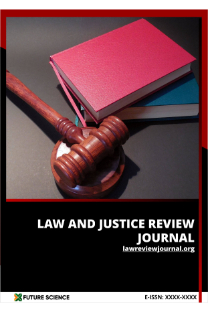The independency of the judiciary and separation of power: Evaluation of the new structure of the high council in the light of the jurisprudence of the ecthr and international documents
___
Cornes, R., McGonnell v United Kingdom, The Lord Chancellor and the Law Lords‟ (2000), 166 P.L., n.13.Eric, A., Judicial independence in Europe Models of self-government and self-responsibility‟, Frankfort/Main, November 7-8th, 2008,at. http://medel.bugiweb. com/ usr/judicial%20independance.pdf
Errera, R., Art.6 (1) ECHR-Right to an Independent and Impartial Tribunal-Im-partiality Examined Separately-Composition of Tribunal‟,(2003), PL
Grosz, S., Beatson, J., and Duffy, P. Human Rights: The 1998 Act and the European Convention, (2000), (Sweet and Maxwell)
Hanna, Suchocka, Analysis on the Draft View of the Consultative Council of Euro-pean Judges on Judicial Councils, adopted by the Venice Commission at its 72nd Plenary Session, (Venice 19-20 October 2007).
https://wcd.coe.int/ViewDoc.jsp?Ref=CCJE(2007)4&Language=lanEnglish&Ver=original& Site=DGHLJudProf
Joaquín Bayo-Delgado, Self-government in courts vertical (hierarchic‟ model) versus horizontal (democratic‟ model) the Spanish model‟, Frankfurt/Main, November 8th 2. at. http://www.medelnet.org/pages/3_2.html. (13 June 2010).
Judicial Reform Act 2005 of England
Lord Justice Thomas, Some perspectives on Councils for the Judiciary‟, Frankfurt Symposium: 7/8 November 2008.
Masterman, R., Determinative in the Abstract Article 6(1) and the Separation of the Powers‟,(2005),6 EHRLR
Mme Valdes-Buloque and Lord Justice, Reports of experts for the CCEJ, Thomas writen on the situations existed in 2007
Mole, N., and Harby, C., Right to Fair Trial, (2001) CoE publishing
Opinion 1 of the Consultative Council of European Judges, (2001), at. www.ccje/ docs2001/ccje (2001) opnle (5.6..2001)
Reports of experts for the CCEJ, Mme Valdes-Buloque and Lord Justice Thomas writen on the situations existed in 2007:https://wcd.coe.int/ViewDoc.jsp?Ref= CCJE (2007)3&Language=lan English&Ver=original&Site=DGHLJudProf
Russell, M., and Cornes, R., The Royal Commission on Reform of the House of Lords: A House for the Future?‟, (2001), 64 M.L.R. 82
Salvi, Giovanni, Self-government and Constitutional Law: The Italian Experience‟, conference in Frankfurt Main, 7-8th november 2008, at. www.medelnet.org/pages/3_2.html (access date:13 June 2010)
The First Advisory Visit Report on Functioning of Judiciary in Turkey: www.abgm.adalet.gov.tr/ altmenu/istisari_ziyaret.html (at. 15-6-2010).
The Fourth Advisory Visit Report On Independence, Impartiality & Administartion of Judiciary www. abgm.adalet.gov.tr/altmenu/istisari_ziyaret.html (at. 15-6-2010)
The Second and Third Advisory Visit Reports on Functioning of Judiciary in Turkey: www.abgm. adalet.gov.tr/altmenu/istisari_ziyaret.html (at. 15-6-2010).
Tombe-Grootenhuis, M., Relationship between the Parties, Lawyers and Judges in Civil Contentious Proceedings‟, at. www.bibliojuridica.org/libros/4/1654/20.pdf (5. 6. 2006)
Turkish Constitution at. www.tbmm.gov.tr/english/constitution.htm (15.6.2010)
Voermans, W., and Albers, P., Councils for the Judiciary in EU Countries, at. www.coe.int/t/e/legal_affairs/legal_cooperation/operation_of_justice/efficiency_of_justice/ Publications/Councils%20of%20Justice%20in%20Europe%20def_.asp (5.6. 2006)
White, R., the European Convention on Human Rights, (2006), Oxford University Press, 4th edition
Yakut, Bahadır, Report on Comparative Analysis of Judicial System of United Kingdom, Sweden and Italy, (2008), Unpublished Turkish Prime Ministry
- ISSN: 1309-9485
- Yayın Aralığı: 2
- Başlangıç: 2010
- Yayıncı: Türkiye Adalet Akademisi
Uber strafrechtliche fragen des sportrechts
A restorative justice approach to working with children in residential care
Accountability and transparency of the high judicial councils- best practices and examples
Building constitutionalism in Kosovo/A
Chronicles of constitutionalism in Georgia
La laïcité Française à l'épreuve du port du foulard islamique et de celui de la burqa
